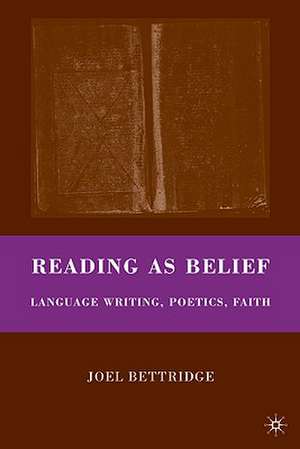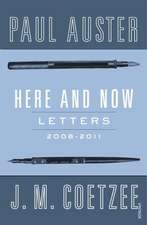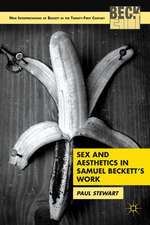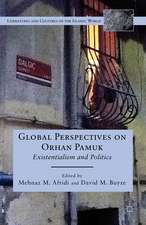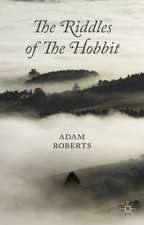Reading as Belief: Language Writing, Poetics, Faith
Autor J. Bettridgeen Limba Engleză Hardback – 18 noi 2009
Preț: 385.84 lei
Nou
Puncte Express: 579
Preț estimativ în valută:
73.83€ • 77.29$ • 61.09£
73.83€ • 77.29$ • 61.09£
Carte tipărită la comandă
Livrare economică 05-19 aprilie
Preluare comenzi: 021 569.72.76
Specificații
ISBN-13: 9780230619425
ISBN-10: 0230619428
Pagini: 192
Ilustrații: IX, 192 p.
Dimensiuni: 140 x 216 x 15 mm
Greutate: 0.36 kg
Ediția:2009
Editura: Palgrave Macmillan US
Colecția Palgrave Macmillan
Locul publicării:New York, United States
ISBN-10: 0230619428
Pagini: 192
Ilustrații: IX, 192 p.
Dimensiuni: 140 x 216 x 15 mm
Greutate: 0.36 kg
Ediția:2009
Editura: Palgrave Macmillan US
Colecția Palgrave Macmillan
Locul publicării:New York, United States
Cuprins
The Dilemma of Secular Reading A Brief History of Language Writing Faith, Belief, Poetics The (Calvinist) Spirit of Understanding Ghosts, Jokes, Shadowtime , and Faithful Interpretation What it Means to be Reader-Centered: Jonathan Edwards Bruce Andrews's Lip Service and the Character of True Reading Reading Alone
Recenzii
"Bettridge's Reading as Belief is surprising, provocative, and engaging. On the surface of it, to link Charles Bernstein and Bruce Andrews to John Calvin and Jonathan Edwards, and to do so around issues of faith and poetics will strike most readers as quite peculiar. And that is precisely the heart of the book's attractiveness: providing us with a truly fresh perspective for considering the premises of experimental poetry and poetics as modes of faith. Bettridge asks us to consider the ethics of reading, instructing us to think about the relationship of poetics to faith. The result is a strange, wonderful book that points toward an ethics of engagement that applies equally to poetry and scripture and that leads us toward a mode of reading that links fully with the conduct of a life." - Hank Lazer, author of Lyric & Spirit: Selected Essays 1996-2008
"Bettridge offers a dare. He dares you to read the notorious Language poets as if they professed a faith. What faith? A faith that creative readers, residing in the gap between words and the world, can constantly remake themselves and what they know." - Stephen Fredman, University of Notre Dame
"Bettridge's skilful handling of this large topic - the poet-text-reader relationship and American liberalism - represents well, I think, the lucid percipience we see throughout the book . . . This is a provocative first book by a young poet-critic, and I am eager to see what he does next." - Textual Practice
"Bettridge contends that Language poetry, despite its embrace of ambiguity, is never meaningless. Rather, it grows from an aesthetics that is always socially and politically charged. The nature of that aesthetic, however, is to disrupt assumption, and therefore a primary question for Language poetry (as with any practice that entails belief) is 'in what terms can we establish a new confidence in what we think we know?'(3). This book employs Language poets and their works as exemplars for a model of language-as-belief not only because of the disruptive and ambiguous quality of Language texts but also because Language writing functions as a clear test case: poets like Charles Bernstein and Bruce Andrews clearly do not traffic in the discourse of faith and belief." -Jacket 2
"Bettridge offers a dare. He dares you to read the notorious Language poets as if they professed a faith. What faith? A faith that creative readers, residing in the gap between words and the world, can constantly remake themselves and what they know." - Stephen Fredman, University of Notre Dame
"Bettridge's skilful handling of this large topic - the poet-text-reader relationship and American liberalism - represents well, I think, the lucid percipience we see throughout the book . . . This is a provocative first book by a young poet-critic, and I am eager to see what he does next." - Textual Practice
"Bettridge contends that Language poetry, despite its embrace of ambiguity, is never meaningless. Rather, it grows from an aesthetics that is always socially and politically charged. The nature of that aesthetic, however, is to disrupt assumption, and therefore a primary question for Language poetry (as with any practice that entails belief) is 'in what terms can we establish a new confidence in what we think we know?'(3). This book employs Language poets and their works as exemplars for a model of language-as-belief not only because of the disruptive and ambiguous quality of Language texts but also because Language writing functions as a clear test case: poets like Charles Bernstein and Bruce Andrews clearly do not traffic in the discourse of faith and belief." -Jacket 2
Notă biografică
JOEL BETTRIDGE is Assistant Professor of English at Portland State University, USA.
